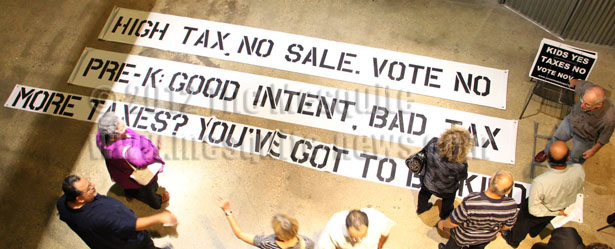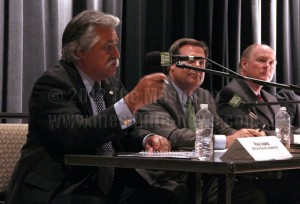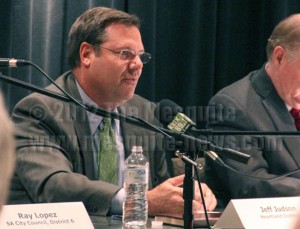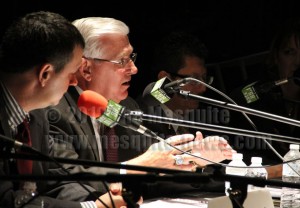Updated 1:30 p.m. Nov. 7: Voters approved Mayor Julián Castro’s Pre-K 4 SA education initiative Nov. 6, which will increase sales tax by 1/8th-cent to fund a high-quality full day pre-k program for qualified 4 year olds. Read more

By Melody Mendoza
Voters will determine Nov. 6 whether Mayor Julián Castro’s Pre-K 4 SA education initiative will be implemented in San Antonio. The initiative, supported by City Council and seven chambers of commerce, proposes an increase sales tax of 1/8th-cent to fund a high-quality full day pre-K program for 4 year olds.
With eight weeks before the vote, city media outlets are organizing forums and town halls to encourage discussion. Stakeholders, citizens and panelists argued for and against the pre-K initiative Sept. 18 during a Town Hall with standing room only hosted by Texas Public Radio’s KSTX.
Opponents and supporters waited for the floor to open with questions in hand while others just hoped to learn more about the initiative.
The Town Hall series featured six panelists who were invited to voice their opinions, concerns and expertise on whether to “invest in our kids,” as the mayor’s slogan reads.
Participants expressed concern for the program’s specifics and had questions about the curriculum, where the program would be housed and how children would be transportated to the centers.
Although many details have not been ironed out, supporters focus on the high-quality, full-day pre-K program that would educate 22,400 four-year-old children over eight years.
Opponents, though, want questions answered before voting day and said the initiative was rushed.
In May 2011, Castro assembled the Brainpower Task Force of concerned business and education leaders to determine if a financial investment could improve education in San Antonio. The task force was headed by co-chairs Maj. Gen. (Ret.) Joe Robles, USAA CEO, and Charles Butt, H-E-B Chairman and CEO.
After a year of research, the task force developed Pre-K 4 SA, which would create four Education Excellence Centers where 2,000 eligible four-year-olds per year could attend pre-K.
Taking a stand on pre-K education
Tuesday’s town hall meeting gathered panelists from business and education professionals and City Council members to express their views of the mayor’s initiative.
Three of the six — John Folks, retired Northside ISD superintendent; Richard Perez, president of the Greater San Antonio Chamber of Commerce; District 6 Councilman Ray Lopez — were in support. They expressed the need for quality early childhood education to improve student readiness for higher education and the workforce.
District 8 Councilman Reed Williams agreed that early education is important, but noted that the initiative was not the most effective way to address education.
Jeff Judson, senior fellow of Hartland Institute, was upfront in his opposition to the mayor’s initiative, suggesting the city should start with improving existing pre-K schools.
Taylor said she had not taken a side, but was invited to offer her knowledge on the research, which proves that quality early childhood education is effective.

District 6 Councilman Ray Lopez
In his opening statement, Lopez said task force members asked many questions when addressing the issue of education.
“Where do we attack this issue?…. Is it at the parental involvement level? Is it at the early childhood level? Is it at the dropout level? Which one of those initiatives did we want to take on first?”
One key question raised by participants was why the task force didn’t tackle issues in the public school system.
After conducting research and discussion, Lopez said the task force focused in on early childhood education.
“We’ve got to do those basic core fundamentals,” Lopez said referring to pre-K. “As we move through the process, we’ll be more than glad to continue the opening dialogue …. I can assure you that this program will evolve.”
District 8 Councilman Reed Williams
As many might question, Williams asked about the appropriateness of the city’s involvement in education. But he went on to say that the city has already been involved in education in an indirect way.
“As you move from indirect support to direct support, there’s a lot of debate,” he said.
He encouraged residents to study the initiative and develop their own opinion.
“It’s pretty transparent, but it is expensive,” he said, adding that it will require an appointed development corporation and requires the city to enter into joint venture agreements with the school districts.
In his opinion, Williams said, “Maybe this is not the most effective way.”
Although some say it’s too late for other suggestions, Williams said he still advocates for the city to tackle early education through direct schools on a charter basis for grades kindergarten through third where teachers will stay with those students to ensure they’re getting a good education.

Jeff Judson, senior fellow of Hartland Institute
Judson was straightforward. He suggested that the city should instead invest in existing programs and argued that the city’s involvement in education is political.
“This pre-K plan is more about politics than it is about children. It is more about building four pre-K mega centers, which will no doubt be adorned with the names of local politicians or their mothers.”
Judson said parents with eligible children are not participating in existing pre-K programs and feared they would not use the new program.
“Some or perhaps most of these parents have made a conscious decision not to participate in pre-K,” he said, adding that those children are mostly likely still getting the basic education they need from home or relatives.
For those children who are simply not getting the education, he said, “We should work to improve existing programs and reach out to these parents if we can find them and encourage them to do something better,” he said.

John Folks, retired Northside ISD superintendent
Folks emphasized his support that early childhood education is important to prepare students for the workforce and ramp to college success. “That has to begin at the pre-K level.”
He said the education that children are receiving between kindergarten and third grade is more academic than when he was in school.
“The bottom line to it for me as an educator and a teacher is that to better prepare our students for success, it starts at the pre-K level,” he said. “Their academic begins at the pre-K and kindergarten level.”
Richard Perez, president of the Greater San Antonio Chamber of Commerce
Perez said he represented 17,000 San Antonio businesses people who were skeptical of the initiative, but after analysis, were convinced that the initiative answered three points — there is a clear need, there will be accountability for the money spent and the program will give children the opportunity to succeed.
Emphasizing the desire to be a tier-one city, Perez said education puts the city on that path.
“I believe and the business community and the greater san antonio chamber of commerce believes that this Pre-K 4 SA is the path to that greatness,” he said.
Lori Taylor, professor at Texas A&M-Bush School of Government and Public Service
As a resource, Taylor covered three points — the return on investment to pre-K education is huge, there is a lot of difference between a high quality program and a custodial program and a full-day pre-K program delivers more benefits for the child and parents.





